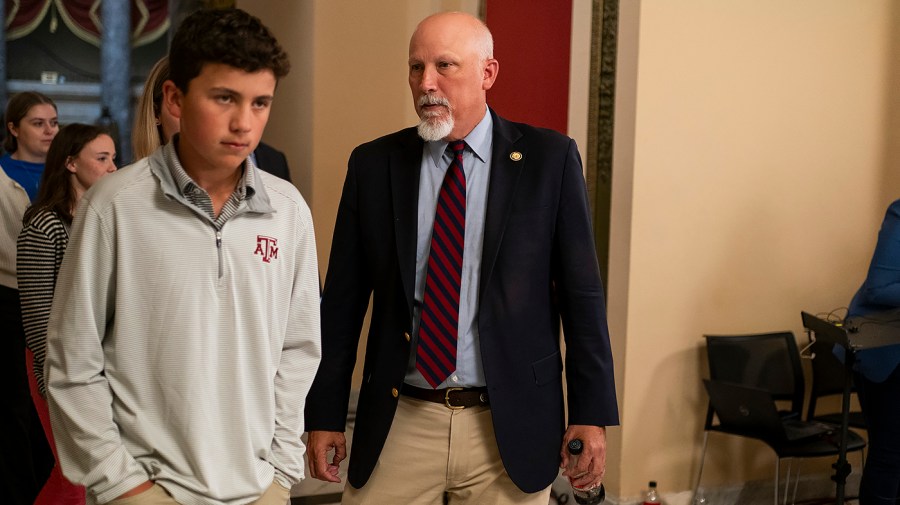
Representative Chip Roy (R-Texas) is at the forefront of a significant shift within the House Republican Conference as several prominent members of the House Freedom Caucus announce their intentions to run for higher office. This wave of departures, expected after the midterm elections, could reshape the dynamics of the Republican Party’s most hardline faction.
On Thursday, Roy declared his candidacy for the position of Texas attorney general. He is joined by other notable Freedom Caucus members, including Andy Biggs (Ariz.), Byron Donalds (Fla.), and Ralph Norman (S.C.), who are all seeking gubernatorial positions. Additionally, Barry Moore (Ala.) has launched a Senate bid, while Andy Ogles (R-Tenn.) has expressed interest in a Senate appointment contingent on Marsha Blackburn (R-Tenn.) winning the governorship.
Some within the Republican Party view the exit of these often contentious figures as an opportunity for greater unity and a reduction in internal strife. Representative Derrick Van Orden (R-Wis.) expressed optimism about the potential for a more productive Congress following Roy’s departure, labeling him a “contrarian” and an “obstructionist.”
Despite these criticisms, many in GOP leadership recognize Roy’s role as a vital intermediary between the Freedom Caucus and the broader House GOP. Representative Stephanie Bice (R-Okla.) emphasized the importance of maintaining collaboration, suggesting that it is crucial for future legislative success.
Over the years, hardline resistance from the Freedom Caucus has often stalled significant votes in the House. Roy has been a central figure in this dynamic, embodying the group’s strategy of leveraging every available point of influence to secure conservative policy victories. His recent involvement in the House Rules Committee has positioned him as a key player, especially during the tumultuous election of Kevin McCarthy (R-Calif.) as Speaker in January 2023.
While some of his colleagues have questioned the overall effectiveness of Freedom Caucus members, Roy and his allies have often taken credit for pushing legislation further to the right. They successfully negotiated for deeper spending reductions and accelerated the expiration of green energy tax credits as part of broader tax cut extensions.
Bice recalled her collaborative experiences with Roy and Donalds during negotiations to prevent a government shutdown. Although they did not ultimately succeed in passing the measure, she noted the rapport built during discussions. She remarked, “Chip fights for what he believes in, and I actually think that’s one of the things that has the potential to make him a great attorney general for Texas.”
Roy, who previously served as Chief of Staff to Ted Cruz (R-Texas), is recognized for his dual strengths in policy formulation and strategic negotiation. Wade Miller, executive director of Citizens for Renewing America, commended Roy’s unique ability to navigate complex political landscapes while advocating for principled policy positions.
As speculation surrounding the implications of Roy’s candidacy continues, observers suggest that GOP leaders, including Speaker Mike Johnson (R-La.), may be relieved by the departures of Roy and other Freedom Caucus figures. Johnson has yet to comment on Roy’s attorney general bid, but it is reported that Roy notified leadership of his decision ahead of time.
Roy’s reputation as a contentious figure within the GOP has led to tension with former President Donald Trump, who previously indicated support for a primary challenger against him following his opposition to raising the nation’s debt ceiling without spending restrictions. Nevertheless, supporters within the Freedom Caucus, such as Keith Self (R-Texas) and Lauren Borbert (R-Colo.), have framed Roy as a steadfast advocate for Trump’s agenda.
Tim Reitz, executive director of the House Freedom Caucus, asserted that Roy’s leadership as attorney general could further benefit the conservative movement. He noted, “We’re losing a lot of great guys with institutional knowledge and experience, but we fortunately have a lot of rising stars coming up who will be the next generation of conservative fighters.”
The Freedom Caucus, founded in 2015, has seen many of its influential members depart for higher positions, including Mark Meadows, who became chief of staff to Trump, and Ron DeSantis, who was elected governor of Florida. Research indicates that members of the Freedom Caucus are significantly more likely to pursue higher office compared to their Republican counterparts, with approximately 17% of them running for elevated positions since the group’s inception, compared to only 3% of other GOP members.
Looking ahead, several emerging leaders, such as freshman Representative Brandon Gill (R-Texas), are expected to play prominent roles within the Freedom Caucus. Miller highlights that the caucus is building a network of state legislators aligned with its vision, suggesting that its influence on policy outcomes in Washington, D.C., will continue to be significant.
Roy framed the current changes within the Freedom Caucus as an opportunity for growth, stating on social media, “A new generation is emerging with @freedomcaucus. And battle-tested fighters are now going home to deliver alongside @realDonaldTrump. The team is growing.” As the political landscape evolves, the impact of these departures on the House GOP remains to be fully realized.







